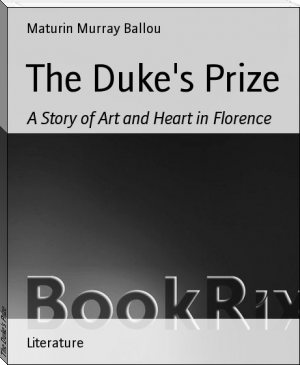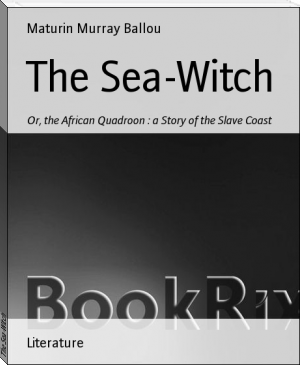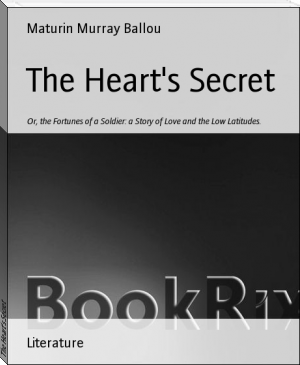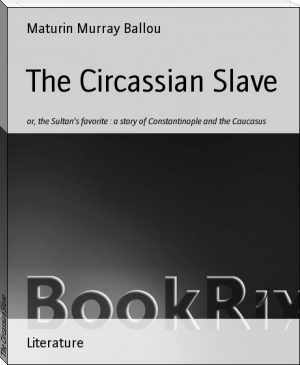The Duke's Prize by Maturin Murray Ballou (popular books of all time TXT) 📕

- Author: Maturin Murray Ballou
Book online «The Duke's Prize by Maturin Murray Ballou (popular books of all time TXT) 📕». Author Maturin Murray Ballou
PREFACE.
THE scenes of the following story are laid in Italy, that land of the sun. They are designed to impress a goodly moral, as well as to amuse the reader--to show that patience and perseverance will conquer all things--and that a poor coat may cover a rich heart. The reader will find also herein, that love raises the humblest; and that true merit, like true genius, tramples upon misfortunes; and that "some falls are means the happier to rise."
THE DUKE'S PRIZE.
CHAPTER I.
FLORENCE.
Lend thy serious hearing to what I shall unfold.
-Hamlet.
COME with me, gentle reader, on the wings of fancy into the mild and genial latitude of the Tyrrhenian Sea. The delightful region of the Mediterranean has been the poet's ready theme for ages; then let us thitherward, with high hopes (and appreciating eyes) to enjoy the storied scenery of its shores. Touch, if you will, at Gibraltar; see how the tide flows through the straits! We go in with a flowing sail, and now we are at Corsica, Napoleon's home. Let us stop at Sardinia, with its wealth of tropical fruits; and we will even down to Sicily,--for this mimic ocean teems with subjects to delight the eye even of the most casual observer, with its majestic boundary of Alps and Apennines, and the velvet carpet of its romantic shores, while its broad breast is dotted with the sails of the picturesque craft whose rig is peculiar to these seas.
It were worth the journey we have taken, if only to behold the curious maritime scene before us now-made up of the felucca, the polacre, and the bombard, or ketch all equally unknown in our own waters.
Well, on with us still; let us up again and new through the canal of Piombino, touching at the isle of Elba, the "Great Emperor's" mimic domain; step into the town lying beneath this rocky bluff; which is crowned by a fort-it is Porto Ferrajo. Look off for a moment from this rocky eminence, back of the town, and see the wild beauty of these Tuscan mountains on the main land. Now, we will over to the Italian coast, and cross, if you will, from Leghorn to Florence. There, we are now in the very lap of genius and of poetry; let us pause here and breathe the dreamy, soothing, balmy air of Italy.
Florence, most favored daughter of Italy, sweet, sunny Florence, where dwelleth the gallantry and beauty of Tuscany, with thy wealth of architectural beauty, thy magnificent churches and palaces, thy princely court and hoarded beauties-favorite of that genial land, we greet thee! How peacefully dost thou lay at the very foot of the cloud-topped Apennines, divided by the mountain-born Arno in its course to the sea, and over whose bosom the architectural genius of the land is displayed in arched bridges; loveliest and best beloved art thou of sunny, vine-clad Italy.
The poetical luxury of Italian genius is nowhere more plainly manifested than in Florence. 'Tis the artist's favorite resort and best school; 'tis the city the traveller likes least to turn his back upon; and the spot being consecrated by poetry and art, where the blood flows quickest through the veins, warmed by a fervid and glowing clime. A clime which breathes in zephyrs of aromatic sweetness, wafted over the fragrant blossoms of the land so redolent of loveliness, that they would seem to rival the fabled Loto tree, which springs by Allah's throne, and whose flowers have a soul in every leaf.
There is a breathing of the arts in the very air of Florence, whose galleries are crowded with the choicest collections of paintings and statuary in the world. Here have ever congregated the talent and beauty of every clime. With the painter, the poet, the sculptor, here sleep, in the city of the silent, Michael Angelo, Alfieri, and like spirits, rendering it hallowed ground to the lovers of art. Proud and lovely city, with thy sylvan Casino spreading its riches of green sward and noble trees along the banks of the silvery Arno, well may a Florentine be proud of his birthplace!
It is in Florence, this very paradise of art, that our tale opens. Here the poor scholar or artist, who seeks to perfect himself by viewing the glorious works of the old masters, may live like a prince on the most moderate and frugal means, in a bright and sunny land, where the heart's blood leaps most swiftly to the promptings of imagination; where the female form earliest attains its wonted beauty, and longest holds its sway over the heart; where art and nature both combine to entrance the soul in admiration; in that land of the sun-genial Italy; that soft, yet wild country, whose children learn the knowledge of poetry and art from visible things, while the rest of the world derive them from books.
It was noonday in Florence, and a group of artists were wending their way from the grand gallery to their midday meal. It was a motley sight to look upon them as they gaily chatted together-for among them were men of different countries. There was the rough, hearty Englishman, the light, witty Frenchman, the intelligent and manly-looking American, the dark, swarthy Spaniard side by side with the dark Italian-fit companions, both in outward hue and their native character-and many others, forming a group of peculiar interest to the beholder.
As the troop emerged from a narrow street and came full upon the bright and sunny piazza, near the splendid shaft of the Campanile, the gorgeous equipage of the Grand Duke was passing the spot. The monarch was returning from a morning drive in the Casino with a small retinue, and accompanied by one or two strangers of distinction. The group paused for a moment to witness the passing of the duke and his suite, and then turned gaily towards their hotel to dine, the duke forming a new theme of conversation to those who, conversing under the disadvantage of but partially understanding each other, from the variety of tongues among them, ever chose the most visible subject for comment.
"What a brilliant turn-out," said one, in honest admiration.
"Those leaders are as proud as their master," said another.
"But he becomes his state well, if he is proud," answered a third.
"Newman couldn't get up a better four in hand," said the first speaker, a young Londoner.
"Who is that by the side of the duke?" asked one.
"The English consul," replied his countryman; "you ought to know him."
"The whole affair now is wanting to my eye," said a young, sentimental artist.
"And what does it want, pray, Mister Critic?" asked the Englishman.
"A woman."
"Egad, that's true! There should be a woman in the picture, if it was to be painted, if only to introduce color."
"Don't be so mercenary," added the other.
And the group thus idly conversing lounged on their way to dine. But see, one of their number still lingers near the base of the shaft, apparently absorbed in admiring its beautiful proportions; his pale but fine intellectual features overspread by a spirit of admiration as he beholds the column. But still there is some other motive than mere curiosity that engages him thus; he seems to have thus designedly dropped the company of the party he was just with. Now suddenly turning and satisfying himself that his late companions were out of sight, the young artist-for so his appearance evidently bespoke him-slowly and sadly retraced his steps toward the grand gallery.
The expression of his countenance was that of suffering and physical pain, as well as of mental inquietude; but his late companions had none of them noticed or cared for this. They could take especial cognizance of the points of excellence in the duke's horses, but not of the grief that shaded a fellow-being's countenance. No, the single artist, who now retraced his steps from the base of the Campanile, let his cause for sadness arise from whatever source it might, was alone in his sufferings, and without any one to share his sorrows.
Once or twice he seemed to hesitate and half turn round again, as if to join the party he had left; but some inward prompting appeared to prevent him from doing so, and once more he walked on by the same street which he had just came. A sigh now and then heaved his breast, as though some mental or physical suffering moved him, but his form was erect, and his step not that of one weakened by physical disease. And yet in looking upon him, an instinctive desire would have possessed the careful observer to offer him aid in some form.
CHAPTER II.
OUR HERO AND HEROINE.
But love is blind, and lovers cannot see.
-Merchant of Venice.
AT the close of a long summer's day under the skies of Italy, the shades of twilight were deepening on a verdant and vine-clad hillside of the Val d'Arno, when two lovers, who had evidently been strolling together, sat down side by side under a natural trellis of vines. The twilight hour of midsummer will lend enchantment to almost any scene; but this is peculiarly the case in Italy, where every shadow seems poetic-every view fit for the painter's canvass.
The gentleman was of frank and manly bearing, and as he had approached the spot where they now sat, with the graceful figure of his fair companion leaning upon his arm, he evinced that soft and persuasive mien, that easy elegance of manner and polish in his address, which travel and good society can alone impart. Around his noble forehead, now bared to the gentle breeze, his long auburn hair hung in waving ringlets, after the style of the period, while his countenance was of that intelligent and thoughtful cast, tinted by a shade of sorrow, which rarely fails to captivate the eye.
In person, he was rather tall, erect and well-proportioned, though perhaps he was rather thin in flesh to appear to so good advantage as he might have done, yet altogether he was of handsome form and pleasant mien. His dress bespoke the hollowness of his purse, notwithstanding he bore about him the indelible marks of a gentleman; and the careful observer would have recognized in him the artist that had separated from his companions on the Plaza at noonday near the shaft of the Campanile.
His companion was manifestly a lady of rank and a most lovely female, satisfying the eye at the first glance, and constantly pleasing the longer it dwelt upon her. When we describe an Italian lady as being beautiful, she must be so indeed; for there is no half way between beauty and the opposite extreme here. There are but few really handsome women in Tuscany, but these few are of a class of beauty that may well have ravished the rest of their sex in this fair clime. Her countenance was radiant with thought and feeling, and her large and dewy eyes of blue--nature's own sweet tint--rested fondly on him by her side.
Her rich and abundant dark hair was parted smoothly across her unblemished forehead, which might have been marble, so smooth and pure, but for the warm blood that flowed through those delicate blue channels. The mouth and features were of the Grecian model, and when she smiled she showed a ravishing sweetness of expression,





Comments (0)